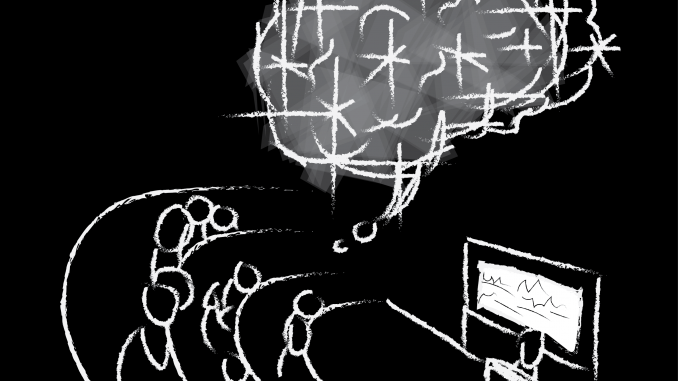
“If you need someone to take you there,” read the syllabi for Jillian Bauer’s journalism classes, “I would be happy to go with you.”
Bauer, a journalism professor, included this in her syllabi to let students know she is willing to walk them to Tuttleman Counseling Services should they find themselves struggling with their mental health or a substance use disorder.
Although she finds it necessary to address students’ well-being in the syllabi, Bauer said she is one of the few professors to speak on the issue in a classroom setting.
Bauer’s own experiences with her substance use disorder made her especially sympathetic to college students struggling with the same issue, she said. Bauer’s past alcoholism surfaced when she first came to Temple as an undergraduate journalism student.
“While I was here, I managed to fall through many cracks somehow,” Bauer said. “Who knows, if someone had reached out to me and verbalized concern at school, I could have entered recovery at a much earlier age. It could have been much different.”

Bauer believes that acknowledging mental health in a classroom setting will generate conversation on the topic and can facilitate students’ paths to recovery.
“We are required to put information for students who have disabilities on the syllabus, so why aren’t we making a note of people who are struggling with mental health and substances?” Bauer said.
According to the National Alliance on Mental Illness, more than 25 percent of college students have been diagnosed or treated by a professional for a mental health condition within the past year. Additionally, almost 73 percent of students living with a mental health condition experienced a mental health crisis on campus.
Bauer believes that while faculty members are taught how to react in a situation where a student’s immediate safety is at risk, addressing a student’s long-term well-being should also be prioritized.
“Everybody in every class knows somebody who’s struggling with substances or mental health,” Bauer said. “Everybody is affected by these things, but in the classroom we aren’t really talking about it. We aren’t really talking about it with policies at Temple.”
Bauer decided to attend a conference in July that addressed university students’ mental health.
“Marginalized to Empowered: Improving Retention and Creating Academic Equity for College Students” was a one-day conference that was held at St. Joseph’s University. Speakers at the conference not only advised professors to include a portion on their syllabus addressing student’s well-being, but they also recommended sending an email that reads, “Hey, are you okay?” when a student begins missing multiple classes, Bauer said.
“It helps students to know that somebody actually cares about them,” Bauer said.
Unlike the School of Media and Communication and the College of Liberal Arts, the Tyler School of Art has a unique system where professors are asked to fill out Advising Alert forms when a student misses class. These alerts are then sent to the advising office so that the student’s educational performance and general well-being can be monitored more closely.
“It allows us to see patterns of behavior from students a lot faster and intervene and try to help them if they need it,” said Gerard Brown, the chair of the Foundations Department at Tyler said.
The program was created by Brown and David Logan, the director of academic advising for Tyler. Brown believes it has benefited Tyler’s Foundations Department greatly.
“I think we are starting to move in the right direction,” Brown said. “Definitely there is a lot more that can be done to recognize how much a student’s mental health, well-being and level of stress is affecting their performance. There’s certainly room for more compassion on that.”
Janie van der Toorn, a peer education graduate extern at the Wellness Resource Center and master’s student in public heath, joined the effort to support students at what she said is “a time of great change, great stress and development.”
She joined the Peer Educator Program four years ago. This is her second year as a graduate extern.
“I think it’s important for us to have a peer education program because information about health and wellness, depending on the topic, can be very sensitive, so if it’s coming from peers, the message can mean a lot more and can be more impactful,” van der Toorn said.
Rachael Stark, associate dean of students, said she always encourages professors to walk students to Tuttleman if they are in need of help. Stark helps runs CARE Team, which is Temple’s behavioral intervention organization that sprung up in the wake of the Virginia Tech shooting in 2007.
Stark said the team intervenes when a faculty member or student expresses concern over another student that may be disruptive in class, exhibiting mental health issues or any observed violence.
“We would get the names of those students and really then work to ensure their safety as well as the safety of the Temple community,” Stark said.
She added that she is glad to hear about professors like Bauer adding a section dedicated to student mental health to the syllabi.
“I think that’s great that she is putting that out there because really the whole thing is to normalize all of our resources,” Stark said. “I think people still feel there is a stigma about going to Tuttleman Counseling Services, like no there is not. There are so many students seeking those services and it is completely normal.”
Jenny Stein can be reached at jenny.stein@temple.edu.
Emily Scott contributed reporting.


Be the first to comment